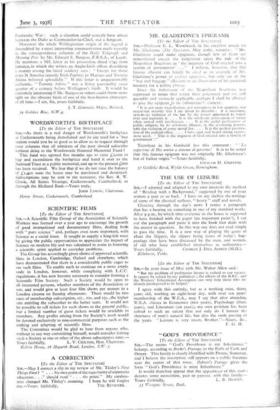MR. GLADSTONE'S EPIGRAMS
[To the Editor of THE St.Ecrarotti SIR,—Professor E. L. Woodward, in his excellent article on Mr. Gladstone (The Spectator, May 20th), remarks : " Mr. Gladstone could make epigrams, though few of them arc remembered except the judgement upon the rule of the Neapolitan Bourbons as the negation of God erected into a system of government' . . ." I believe, however, that this famous allusion can hardly he cited as an example of Mr. Gladstone's power of making epigrams, but only (as in the " bag and baggage " allusion) as an illustration of his punctual memory for a telling phrase.
Since the indictment of the Neapolitan Bourbons was expressed in terms that retain their poignancy and are still quotable and variously applicable, perhaps I shall he allowed to give the epigram i n. its (abbreviate') context :
" It is not mere imperfection, not corruption in low quarters, not ocessisnal severity that I am about to describe ; it is incessant, systemuic violation of the law by the power appointed to watch over and maintain it. . . . It is the wholesale persecution of virtue when united with intelligence. . . . It is the awful profanation of public religion, by its notorious alliance, in the governing powers, with the violation of every moral law. . . . It is the perfect prostitu- tion of the judicial office. . . . I have seen and heard strong expres- sions used. This is the negation of God erected into a system of government '."
Trevelyan in his Garibaldi has this comment : " La negazione di Dio eretta a sistema di governo.' It is to be noted that this famous epigram was not originally Mr. Gladstone's but of Italian origin."—Yours faithfully,
GWILYM 0. GRIFFITH.
57 Goldislie Road, Wylde Green, Birmingham.


















































 Previous page
Previous page